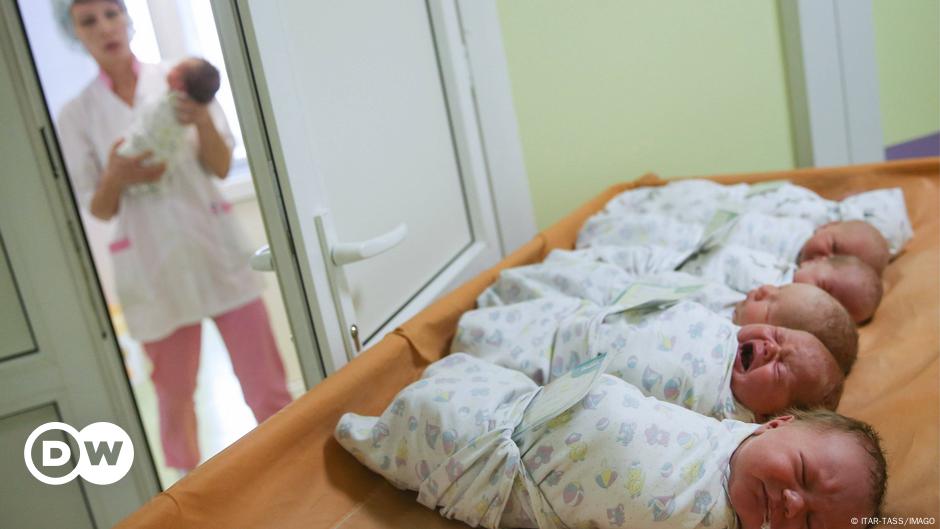Researchers said they have noticed a particularly sharp downward trend in eastern Germany. A new report estimates almost 80,000 fewer children were born in 2022 and 2023 than would have been expected.
The Ifo Institute for Economic Research said in a new report released Wednesday that Germany is seeing a sharp decline in birth rates, with federal states in the east of the country the most affected.
Researchers at the leading economic think tank cited a number of reasons behind the declining birth rate, including the COVID-19 pandemic and the war in Ukraine.
Additionally, high inflation has prompted “young families to put off having children for the time being,” said Ifo researcher Joachim Ragnitz.
Current world politics showing everybody we haven’t learned anything in the last century? Might a factor?
The ifo institute is also usually first to suggest less corporate and capital income taxes, less government spending, less social services and longer working hours as well as later retirement to “stabilize” the economy.
Truly a miracle why people arent getting as many kids anymore.
We clearly need to deport more immigrants!
Always baffles me how people don’t comprehend that our population basically depends on migration. The younger we are, the more of us have a migration background, up to 40%.
The consequences under upcoming fascism (regardless of migration) will be to propagate the “traditional family” and forbid abortions (like we see in the USA).
It might just be my personal experience, but I am German and my personal birth rate has been steady all my life.
To add anything of substance here, there’s a good ol Kurzgesagt video on this. TLDW: Global phenomenon, hard to predict, just investing more money on parents and their needs has been tried and did not really work. Governments should still try to ease the burden of new parents because Jesus Christ they have it hard enough.
Somewhere else I heard that maybe our pessimistic look at the future is to blame and we should try to spread optimism more (or lay the foundation for a better future so people can actually be optimistic), but that’s less well researched. Not least because optimism isn’t easily quantifiable.
I’d wager that the investment of paltry sums compared to the cost of raising a child while public preschools are filled to the brim and there’s a lack of teachers and affordable after school facilities for parents to leave their kids probably has something to do with it. Luxemburg, for instance, is one of the wealthiest countries in Europe and parents there have to register kids for preschool when they’re born to even get a chance at a spot.
I mean, sure, there’s tax breaks for parents and if you’re lucky, something like 200€ per child per month, depending on the country. That’s ridiculously low. Salaries keep stagnating, the cost of living keeps increasing, and young adults basically have to work several internships for free to even get a chance at landing a half decent job and afford a one bedroom apartment. Meanwhile, the pandemic saw the richest people get even richer with their tax rebates and deductions upon rebates and deductions.
This is an economic issue, i believe, rooted in the progressive increase of wealth inequality in our society. It’s just that the help being provided to parents is nowhere near enough. I want to be a dad, but i can’t while wealth keeps being redistributed to millionaires while we get, what, a miniscule tax rebate and maybe a couple dozens to hundreds euros to afford ever skyrocketing rents anywhere there’s a half decent paying job? This isn’t the industrial ages where if half your kids didn’t go to school, it’s fine. The population will decrease until salaries that are in line with supporting children in a developed country start being a reality to the majority of the population.
And that Kurzgesagt video says young people prefer to travel and live life. Man, i wish i was traveling and going to concerts. I barely go anywhere since the pandemic and i have nowhere near the wealth required to even move to a 2 bedroom apartment, furnish a baby room and buy all the required knick knacks to raise a newborn child and i have a pretty decent income.
Pessimism is definitely part of it. Homeownership here in the US is at an all time low and I blame that too. When renting, you’re moving every few years and adding kids on top of that? Fuck that.
People are also more isolated and dating has never been more difficult for average people. Intimacy has been destroyed in our modern world
We have one of the worst rates of home ownership in DE, compared to the rest of EU: Page is in german but the graph is pretty much self-explanatory.
But that can’t be the sole reason, because the home ownership rates are actually better in the east than in the west. Hmm, during the Cold War, the former GDR actually had incredible child care. Even smaller companies were often required to have some sort of Kindergarten and other support for parents. Maybe this is still remembered by today’s potential parents, and - like someone said ITT - parents have it hard enough already.Fun fact: This was explained to me (in High School…) because “the enemy” wanted to indoctrinate children at a very young age because communism… I didn’t even had to ask, that came immediately when the then GDR was discussed as part of the official curriculum.
Fatalistic is the new Pessimistic. Inevitable climate
changecatastrophy and social inequality / fascism is on the rise.Who the fuck would send his beloved and precious kids into that world… I don’t, I know it would break my heart imagining the suffering they face. (Same is true for your children too, that’s why babies make me sad)
Maybe we should be concentrating on measuring the quality of life … not the quantity of life
The quality already drops, because you can’t find people to do stuff.
You literally can’t get someone to replace your furnace/heatpump within the next month. There are not enough people to care for seniors, not enough people to stock shelves. Doesn’t sound super nice.
No, no, no. There are enough people, just not enough people who can go through 3 years of shit apprenticeship pay to become a worker. Once upon a time you could maybe get by with an trainee salary, then people had to be supported by their parents, then they had to either be in a romantic relationship or live in dorms to share an apartment, in addition to their parents support. Now, even that isn’t enough anymore.
No, there are not enough people. You can’t find enough people to stock shelves, that is an extremely unqualified job, it takes about 15min of training to do it.
A shortage of unskilled labor is almost unheard of, especially on a large scale. Local businesses having trouble to stock their shelves is a sign of a failing business rather than a unskilled worker shortage.
well it’s happening , in germany, right now, on a large scale, in every sector
Maybe there’s too many shelves? I’m only half joking.
The birth rate, or the average number of children that are born to a woman over her lifetime, has dropped from 1.58 children per woman in 2021 to 1.35 currently.
In the years from 2011 to 2016, Germany’s fertility rate rose from 1.39 to 1.59 due in part to better overall conditions for families with children as well as the arrival of immigrant families with higher fertility rates.
So, basically, all the recovery since 2011 has been lost.
No global recovery from 2008. A case could be made for no recovery from the .com bust but that’s a bit more nebulous. We have not returned to the 08 baseline.
We keep taking more and more money out of the middle class but they don’t have any more children We don’t get it.
Fertility rate of 1.35 is REALLY low. Not as low as South Korea. But on par with Japan.
I wouldn’t want to birth my child into Nazistan as well. Fuck that.
DW News - News Source Context (Click to view Full Report)
Information for DW News:
MBFC: Left-Center - Credibility: High - Factual Reporting: High - Germany
Wikipedia about this source










